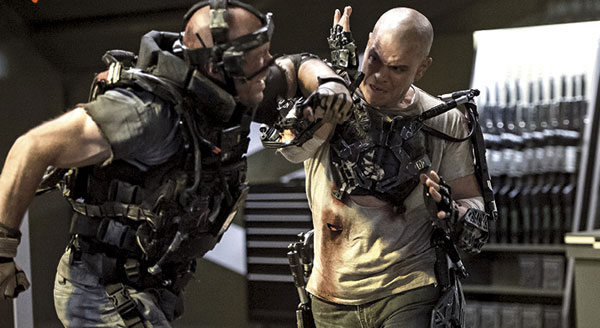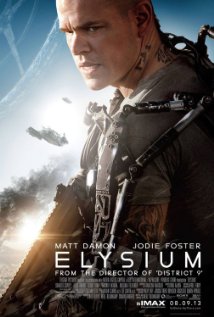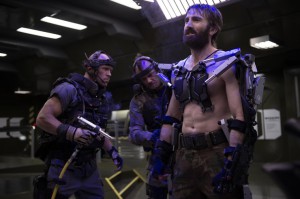Directed by Neill Blomkamp
Written by Neill Blomkamp
USA, Canada, and Mexico, 2013
District 9 offered the promise of a fresh new talent in writer-director Neill Blomkamp. Elysium doesn’t totally squander that promise, but at least raises the disturbing possibility that District 9 may have been a fluke. More likely, Blomkamp will be best served in the future by directing someone else’s script, as well as maybe learning that tripods are an action-movie director’s best friend. Elysium, sadly, is saddled by clunky dialogue, rushed storytelling, and sometimes incomprehensible action sequences, despite a solid core in the form of lead Matt Damon.
Elysium takes place in the year 2154, when diseases and overpopulation have become so overwhelming that the rich have escaped to the eponymous space station hovering above the Earth, replete with cutting-edge technology, including personal medical devices that can heal any malady. Unfortunately, everyone who’s not flush with cash is stuck on Earth, which has turned into a global slum. Max DeCosta (Damon) is an ex-car thief and factory worker living in the Los Angeles area who becomes ensnared in a greater scheme to break into Elysium and open its highly secure doors to the poor after being gravely injured due to radiation poisoning. Soon, Max is fitted with a grisly exoskeleton and faces off against a South African thug (Sharlto Copley) working for the imperious Defense Secretary (Jodie Foster), while trying to gain passage to Elysium and cure his fatal disease.
It sounds like there’s a lot going on in Elysium, and on the surface, one could make connections between this sci-fi dystopia and the current immigration debate going on in the United States—the poor who attempt to sneak their way onto Elysium are dubbed “undocumented”—or with the constant furor over universal health care in the Western world. Blomkamp, of course, tried reframing the haunting effects of apartheid in South Africa through an extraterrestrial lens in District 9, but the world he created there felt lived-in and unforced; here, it always feels a little fake, a bit too staged. Amazingly, the totally foreign environments of District 9 were more authentic than the more recognizable ones in Elysium. Even with familiar faces like Damon, Foster, and William Fichtner, Elysium struggles to maintain a fully formed world, more inconsistent than anything else.
Perhaps the best example of the inconsistency of Elysium’s world is in Foster’s deliberately but somewhat exhaustingly hammy performance as Defense Secretary Delacourt, who has nefarious machinations in mind for her future on the space station. When we first meet Delacourt, she’s hobnobbing with her colleagues, speaking a mix of English and French; after that scene, she mostly jettisons the French, and begins speaking in a strange, haughty blend of accents, from New England American to British to somewhere in between. On Earth, also during the first few scenes, we see a number of characters jumping from English to Spanish, making one wonder if, perhaps, Spanish is the language of the poor and French the language of the rich in this future. However, none of the other wealthy characters speak as comically patrician as Foster does; Fichtner’s snooty businessman has a more robotic quality to his voice, but the other rich folks talk with no vocal affect. This inability to stick to what could be an interesting idea about how society has changed only heightens Foster’s daring but stumbling work.
Outside of a shaved head and some tattoos, Damon plays, essentially, the charming Matt Damon character. Post-Jason Bourne, he’s not out of place wielding firearms, and he’s just as adept at the more humane material. If anything, Damon feels a bit adrift in Elysium, his character less interesting than his situation and the people pushing him to and fro within it. Copley, as a cartoonishly psychopathic villain, certainly is a far reach from the complex, somewhat unlikable hero he played in District 9, and his character here is the source of the most striking, if disgusting, visual in the film. However, his nasty Agent Kruger is maybe a good way of highlighting the problems in Elysium that aren’t as present in District 9: from the first shot, it’s clear who the hero and the villain are. There was complexity in District 9, even if that film is far from perfect. Elysium is too simple and black-and-white in its storytelling.
Blomkamp proved with District 9 that he has the chops to be the next great action director. There, his reliance on shaky-cam photography made sense within the story. He’s relying on that technique again in Elysium, where it’s more a crutch. So many of the action sequences could be clearer and more coherent with a camera that wasn’t swinging wildly from side to side, up and down. (Mercifully, Elysium is not in 3D; that would only have made the shaky-cam worse.) At one key moment, though, as the camera hovers directly behind Damon’s shoulder as he holds a rifle, ready to fire at Copley and his cronies, Elysium resembles nothing more than a first-person shooter video game. In that scene and other fiery moments, Elysium falls flat precisely because it falls into the traps District 9 avoided. District 9 was an arresting, intense action film with a sense of purpose. Elysium is chaotic, formless, and montage-heavy, leaving too much to the imagination.
— Josh Spiegel




